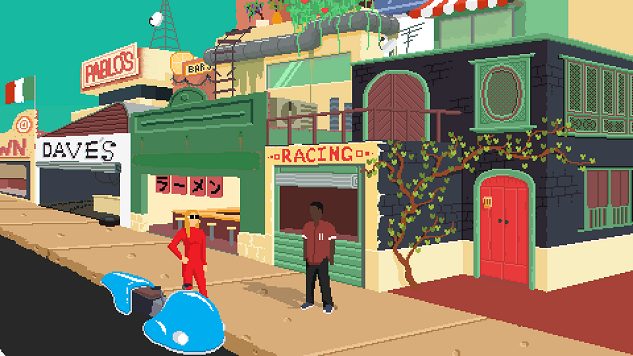
One of my favorite games this year was a racing game where winning isn’t as important as looking cool while doing it. In Desert Child I became a determined hoverbike racer who does a series of odd jobs in order to raise $10,000 to enter (and win) the Grand Prix on Mars. And while the racing is filled with laser guns and quick weaves through cars, the rest of the game is about taking your time, enjoying the rain, and taking a moment to appreciate the ride to the top.
Desert Child proves that racing games can be about more than just racing. It’s about staying in control of your entire life. Being a good racer requires constant maintenance of your bike as well as yourself. The game provides stats on you and your bike, including the health, hunger, and even notoriety if you turn to more nefarious ways of earning money. Races can really wear down a hover bike, so you have to take it in to get repaired. You can also equip different features to your bike in order to have new abilities, such as collecting more coins, or increasing your bike’s ammo count. Your character will also become hungrier after each race, which affects how fast the bike will go.
The most exciting part for me wasn’t the fast-paced hoverbike races, but the hustle and bustle of the city on Mars. When the game starts, you’re on a small street on Earth. This is set as the tutorial section of the game. There are only a few stores to visit, like a pawn shop to sell things for car parts, or a ramen shop to fuel your stomach. After earning enough money, you can finally afford a ticket to Mars, where the Grand Prix is being held.
Once there, the map expands exponentially. When I first landed on Mars and walked around, I was blissfully overwhelmed. The city is extremely colorful, both in its people and its places. It genuinely feels like moving to a new city that you are completely unfamiliar with. And as in real life, it’s a true accomplishment when you’re finally comfortable and familiar with your new town—when you have the roads down, when you know the fastest way to the ramen shop, the best beans to buy that won’t give you negative side-effects, the right time to talk to the lifeguard so you can play with his laser guns. The city is equipped with everything you need to prepare yourself for the next race, but there are plenty of little activities that brings Mars to life. There’s no one place to eat, or to get your bike repaired. There’s also no one way to earn money; you can take up a pizza delivery gig, or find yourself trying to hack through a vault to steal money.
Yet even with the exhilarating races and the dizzying whir of the city, Desert Child remains extremely calm and collected. At first, the juxtaposition between speedy races and the protagonist’s unhurried trips through the city felt too jarring. I was ready for speed, and wasn’t prepared for any sort of delay. But as I played the game more I realized that it’s about being cool, which, as usual, means staying relaxed and in control. If you’re cool you don’t run, but stroll. You have to do everything in style, including race.
The game’s groovy trip hop soundtrack, Cowboy Bebop vibe, and slow-walking protagonist all maintain a slow, steady beat that really helped me relax and realize racing games don’t have to go a hundred miles an hour. Desert Child feels like an homage to city-living, to hip-hop, and trying to achieving your own goals at your own pace no matter what. It’s a chill approach to racing that’s as refreshing as it is necessary.
Shonté Daniels is a poet who occasionally writes about games. Her games writing has appeared in Kill Screen, Motherboard, Waypoint and elsewhere. Her poetry can be seen at Puerto del Sol, Baltimore Review, Phoebe, and others literary journals. Check out Shonte-Daniels.com for a full archive, or follow her for sporadic tweeting.